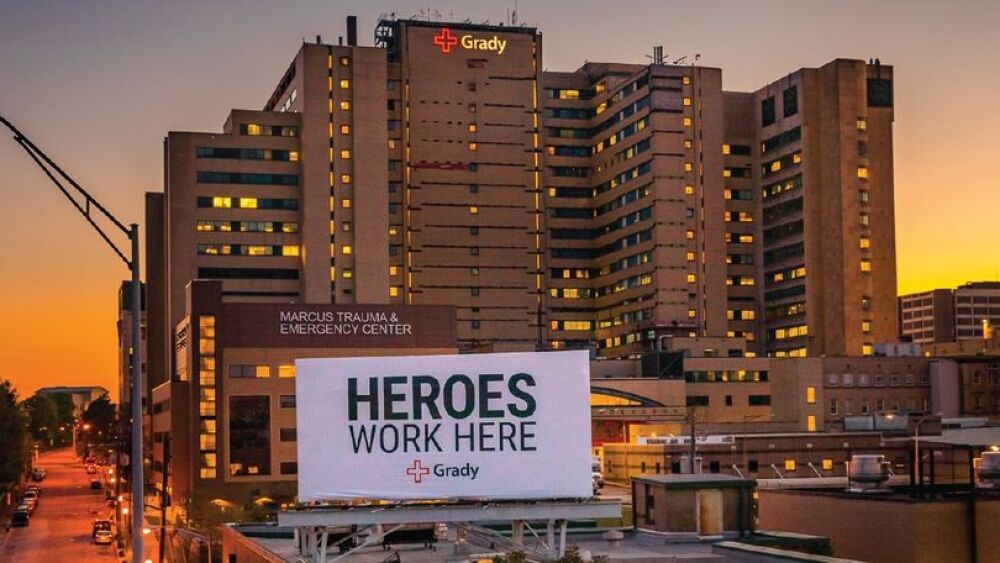Michael E. Kanell
The Atlanta Journal-Constitution
ATLANTA — Workers at Grady EMS have filed complaints with the National Labor Relations Board, charging the hospital with unfair labor practices.
The filing, rejected in a statement by Grady Memorial Hospital officials, was made by a national union of EMTs and paramedics, saying they were acting on behalf of unnamed Grady employees who had seen the violations firsthand.
The complaints were spurred by what workers see as attempts to interfere with legal organizing activity and discourage workers from being involved or supporting a union, said Clinton Faulkner, assistant representative for the International Association of EMTs and Paramedics, under which the Grady workers are seeking to unionize. “It is certainly sounding like it’s rough going for these hard-working folks in Grady.”
Filed Tuesday with the NLRB, the complaints include allegations that the management retaliated against people for organizing, changed work schedules on short notice and made threatening statements to workers about what would happen if organizing efforts continued.
“There has also been surveillance of people,” said a paramedic, whose identity is being withheld because she fears retaliation for speaking publicly. The report also did not list any names.
However, hospital administrators said in a statement that any employee concerns can be addressed internally in a “collaborative work environment” that is “free from the fear of retaliation.”
Moreover, Grady hospital officials rejected the complaints as vague charges coming from outsiders, allegations that are not consistent with the history of management-worker relations.
“IAEP does not represent Grady EMS employees,” the statement said. “Additionally, the complaints filed are broad, with no specific details provided. Grady has always prioritized the fair treatment of our employees.”
For more than a month, a group of workers has been trying to organize a union for the approximately 180 employees of Grady Emergency Medical Services, which provides ambulance and other services to the city of Atlanta and many surrounding counties.
The group includes paramedics, emergency medical technicians, nurses and others.
Grady, one of the region’s best-known institutions, has been the ambulance provider in the city for more than a century. But it has lately been under fire for slow response times on 911 calls. Some workers blame those problems on inadequate staffing and they say the treatment of employees is a big reason that Grady struggles to retain staff.
Grady administrators deny that and say staffing issues began with the pandemic.
Workers who are organizing say they have been unsuccessful at getting their concerns met. They cite concerns about the equipment, about pay scales and about how scheduling is often done in ways that are disruptive to workers’ families.
Federal law requires organizers to collect the signatures of 30% of those in the unit to force a vote on a union. Organizers say they would like to collect much more than that before submitting the signatures, but they decline to say how far along they are.
If they submit enough names and the NLRB orders an election, approval of 70% of workers would be required for establishment of a union. If the organizers do clear that threshold, it can still take months for management to negotiate a contract.
Separate from the complaints filed this past week, the workers and union officials also say that a new dispatch system installed by Grady has proven to be unreliable and unsafe. EMTs told The Atlanta Journal-Constitution that the system crimps their ability to call for more help when their own safety is threatened. They can still call, but their location is not automatically conveyed to dispatchers.
Some patients have psychological or drug issues and become violent, a paramedic said. “A lot of the time, trouble happens en route to the hospital. People attack you or try to jump out of the ambulance.”
Moreover, with the previous system, when they were called to a site to provide assistance, they could check to see if their dispatchers had noted other issues at the same address. That meant they would usually know before arriving at a scene if there were a fire or an active shooter. Using the new system, workers said they do not see that additional information.
Grady officials acknowledged that the system is new but disputed the workers’ descriptions.
“All protocols remain the same and crews still have visibility (of) who is on scene by call type,” the statement said. “We believe the source of these unfounded claims is a union that does not represent Grady employees.”
Grady has added a paramedic and nurse to the dispatch center to improve responses, the statement said. “The safety of our first responders is of the utmost importance.”
___
(c)2022 The Atlanta Journal-Constitution (Atlanta, Ga.)












